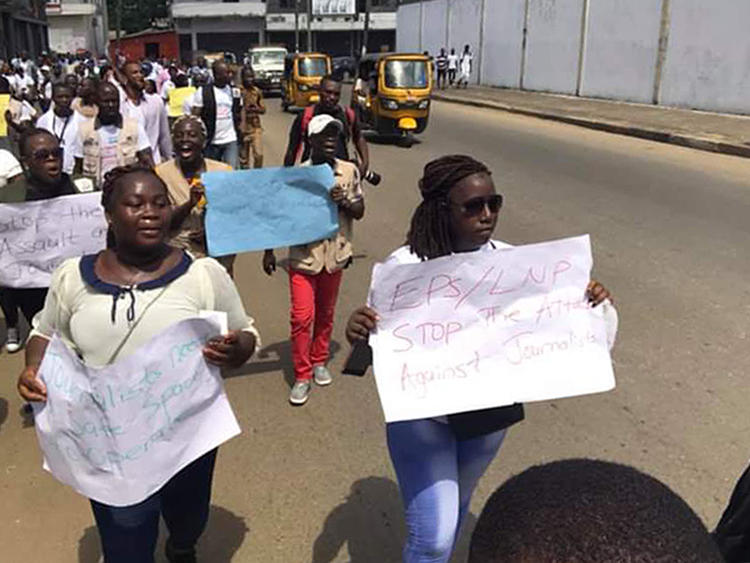Since February 13, 2020, Liberian security forces have harassed, assaulted, or detained at least four journalists during the course of their work, according to the journalists, who spoke with CPJ, and a petition from the Press Union of Liberia, an independent media workers’ advocacy group.
On February 13, police arrested Methuselah Gaye, a journalist with the privately owned Fabric Radio broadcaster, at his home in Yarpah Town, in south-central Liberia’s Rivercess County, and detained him for 12 hours, the journalist told CPJ in a phone interview.
Police detained him for about five hours in Yarpah Town, and then held him for an additional seven hours at the police headquarters in Cestos City, he said.
Gaye told CPJ that he was investigating a killing in the area, and told another journalist via Facebook Messenger that he believed police were attempting to cover it up. When police arrested him, officers told Gaye that they were responding to a complaint from a senior Rivercress police official alleging that Gaye had spread lies about him on Facebook, the journalist told CPJ.
Police released Gaye without charge after the press union intervened in his case, he told CPJ.
On March 3, officers in the Liberian National Police and President George Weah’s Executive Protection Service harassed, beat, and detained journalists Aryee Davis and Salam Kaloko while they were covering a protest in support of a proposed war crimes court in Monrovia, the capital, according to the journalists, who spoke with CPJ via messaging app, and a statement by the Press Union of Liberia.
A police officer punched Davis, a parliamentary reporter for the privately owned broadcaster Truth FM, in her back and neck, and officers detained her for two hours at the local headquarters, she told CPJ.
She had interviewed senators in Liberia’s parliamentary complex shortly before police arrested her, Davis told CPJ.
She was released without charge after Daniel Nyakonah, the vice president of the Press Union of Liberia, arrived to negotiate her release, she said. Davis said that officers looked through her phone during her detention but did not appear to have changed or deleted anything.
Officers in Weah’s Executive Protection Service slapped and manhandled Kaloko, a reporter with privately owned broadcaster Maggie Online TV, while he was photographing protection officers clash with protesters, he told CPJ.
The officers pulled Kaloko’s bag with his camera and other equipment from his hands and confiscated it, he told CPJ. He told CPJ that he then left the scene. The officers injured his hand, and he later visited a doctor about lingering pain, he said.
Kaloko told CPJ that police had not returned his bag, which contained a camera and other equipment including his phone and a tripod, as of March 13.
On March 6, Trokon Roberts, the head of the Executive Protection Service, wrote a letter to the Press Union of Liberia, which CPJ reviewed, stating the service “sincerely regretted” how Kaloko was treated, and would carry out the necessary disciplinary action against the officer concerned. In a phone interview with CPJ on March 13, Osel Williams, Roberts’ media assistant, said the officer had been suspended from duty.
Kaloko’s equipment had been transferred to the Liberian National Police, Roberts’ letter said.
On March 4, at about 8 p.m., Executive Protection Service agents in Gardnersville, a town within Monrovia, detained Benjamin Quaye Toby Johnson, a reporter with the privately owned Cyclone Newspaper, while he was reporting on the alleged shooting of a woman by an Executive Protection Service officer, and held him overnight, the journalist told CPJ in a phone interview.
When he sought comment from Executive Protection Service agents about the woman’s allegation, the officers told him to leave and get more evidence, he said. When he returned, an officer demanded he drop his equipment and take off his shirt, Johnson said. The journalist added that agents smashed his phone when he tried to alert the Press Union of Liberia about his impending detention.
Officers instructed him to write a statement explaining his actions and then locked him in a cell until about 10 a.m. the next day, when he was released without charge after Nyakonah and other press union officials negotiated his release, he said.
Willams told CPJ on March 16 that he was not aware of this incident and could not comment.
Liberian National Police spokesperson Moses Carter did not reply to CPJ’s requests for comment via messaging app, and did not answer phone calls from CPJ.
On March 12, the Press Union of Liberia staged a protest at government offices in Monrovia and handed over their petition registering the union’s concern over increased attacks against journalists, according to news reports.
In addition to Gaye, Davis, Kaloko, and Johnson, the union’s petition cited security forces’ actions against four additional journalists: Bryan Blayon Dioh Jr., Kennedy Koloh, James Kadi, and Josephine Seekey. CPJ spoke with those journalists, but did not find that the attacks against them were related to their work as members of the press.
Security forces assaulted or detained at least three other journalists in connection to their work since the beginning of 2020, according to CPJ research. They include Christopher Walker, an editor with the newspaper Front Page Africa, Kolubah Bobo Akoi, a reporter with the local broadcaster Kintoma Radio FM, and Zenu Miller of OK FM, who died three weeks after his alleged assaulted by members of the Executive Protection Service.
In September 2019, an Executive Protection Service officer also manhandled freelance sports reporter Moses Garzeawu while he attempted to interview Weah at a soccer match, the journalist told CPJ. As seen in a video shared with CPJ, Weah replied to a question from Garzeawu, but then the protection officer roughly pulled the journalist away and cut the interview short.
Garzeawu said he complained to the press union at the time and said he was not surprised that the Executive Protection Service agents and police continued to assault journalists with impunity.
